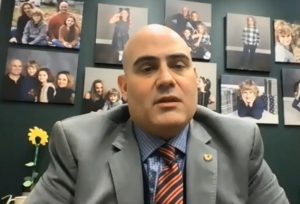Bill would end restraint and isolation of students
By Peter Hancock Capitol News Illinois — March 3, 2021
Rep. Jonathan Carroll, sponsor of a bill calling for a ban on the use of prone restraints in public schools, testifies about the bill during a virtual committee hearing Wednesday, March 3. (Blueroomstream.com)
SPRINGFIELD – A House committee agreed Wednesday, March 3 to continue working on a bill that aims to end the use of physical restraints and isolation as a way of controlling misbehaving students in public school classrooms.
House Bill 219, sponsored by Rep. Jonathan Carroll, D-Northbrook, was introduced in response to a 2019 article by Pro Publica Illinois and the Chicago Tribune that documented the extent to which those practices are used in Illinois schools and the harmful effects they have on children.
Carroll said he was subjected to isolation and restraint when he was a child and that he still lives with the memory of those events.
“The fact that we lead the country in these is disgraceful,” he told a House education policy committee. “It’s something that I don’t sleep at night thinking it could happen to my children.”
If approved, the bill would prohibit the use of “prone restraint,” in which a person is held face-down on the floor or other surface while pressure is applied to the student’s body to keep him or her in that position, as well as mechanical and chemical restraint.
The bill also provides that timeouts, isolated timeouts and other forms of physical restraint could only be used when the student’s behavior poses an “imminent danger of serious physical harm to the student or to others,” and it would direct the Illinois State Board of Education to develop a plan for greatly reducing the use of those practices over the next three years.
Cheryl Jansen, public policy director for the disability rights organization Equip for Equality, said there is a large body of research into the effects and dangers of restraint and seclusion.
“And what those resources have also demonstrated is that the use of restraint and seclusion is not therapeutic, and it’s not educational,” she said. “In fact, they may exacerbate the very behaviors that they purport to address.”
Chelsea Filer, founder of the group Breaking Code Silence, told of her own experience being subject to restraint and isolation as a teenager when she was admitted to a residential treatment facility for treatment of her ADHD.
“What I experienced within this facility will haunt me forever,” she said. “I witnessed a common practice of the use of dangerous prone restraints used far too often, and for nearly any reason the staff deemed necessary. To this day, I cannot remember a single incident in which either I or any of my peers were a danger to themselves or others. And yet, we were still restrained and placed in solitary confinement for days, sometimes weeks at a time.”
But Paula Bodzioch, education director for Marklund Day School, which operates residential schools in Illinois for people with profound developmental disabilities who cannot be served in public schools, argued against a complete ban on prone restraints. She said the method is sometimes necessary, as a last result, for a small number of students whose behavior becomes uncontrollable.
“And I want to make that clear, it is not a go-to, and we understand the ways in which prone restraint has been used in not the best manner,” she said. “But we know that with trained staff, this is not implemented as a punishment, but rather as an emergency procedure to keep the students safe at that time.”
Bodzioch asked the committee to consider carving out an exception in the bill so that prone restraints could still be used in emergency situations after other less drastic efforts to control a student’s behavior have failed.
But Kyle Hillman, of the Illinois Chapter of the National Association of Social Workers, said a number of other states have banned the use of prone restraints, and schools similar to Marklund in those states have found other ways of dealing with students’ violent outbursts.
“And so, when we talk about carving out exemptions, we’re kind of setting a precedent of saying that some kids shouldn’t be saved from these barbaric things and others,” he said.
Still, some Republicans on the committee, including Reps. Avery Bourne, of Morrisonville, and Steven Reick, of Woodstock, said they believed there should be an exception for the use of prone restraints, if a parent or guardian consents to its use, and Carroll agreed to pull the bill from consideration so he could meet with stakeholders to discuss drafting such an amendment.
Carroll said he would bring the bill back to the committee next week.







